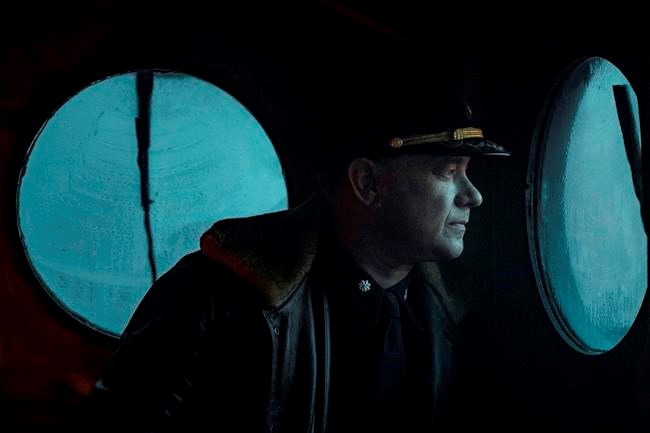He’s Forrest Gump. He’s Mr. Rogers. He’s Woody.
But with all the famous titles Tom Hanks has owned, few have fit as snugly and as smoothly as “captain” — whether it’s fending off Somali pirates in “Captain Phillips,” landing a plane on the Hudson in “Sully,” finding his way back to Earth in “Apollo 13,” or commanding WW II troops in “Saving Private Ryan.”
Now Hanks, our square-jawed Everyman, “America’s Dad” even when his characters don’t have children, is playing a captain again, in the taut new naval thriller on Apple TV+ — yet another of his forays into World War II, this time in the treacherous North Atlantic.
And let’s face it, there’s something soothing merely in the sight of Hanks wearing a helmet that says “CAPT" in these days when the world feels like it’s turned upside down (to quote from another big streaming film of the month, “Hamilton.”) As one character tells him as the war is just beginning: “The world has gone crazy, Ernie.” Indeed.
“Greyhound” is a passion project for Hanks, who penned the script and whose interest in World War II has taken him from “Saving Private Ryan” to “Band of Brothers” to “The Pacific.” Here, he focuses on a lesser chronicled part of that war: the Battle of the Atlantic, which started in 1939 and ended in 1945 with Germany’s defeat. As the film tells us in the credits, Allied losses included 3,500 merchant ships and 175 warships sunk, and more than 72,000 crew members and troops killed (some estimates have the human loss even higher.)
Based on the novel “The Good Shepherd” by C.S. Forester and directed by veteran cinematographer Aaron Schneider, “Greyhound” is perhaps not so much a thriller as a very spare, economical drama — a tightly focused account of one voyage, from one perspective: that of Capt. Ernie Krause on his warship, the Greyhound, leading a convoy of 37 supply vessels to Liverpool.
All the background you really need to know is that the supplies ferried along these routes were crucial to the Allies: they included arms, food and other crucial staples. But the ships had to forge a treacherous path across the sea, particularly the so-called “Black Pit,” the section of ocean not reachable by air cover from either U.S. or British forces.
So for 50 hours here, the ships need to fend for themselves against the Germans and their U-boats. Enemy forces taunt the Greyhound with radioed threats — “You and your comrades will die today,” they warn. The voyage is both monotonous and terrifying. For hours nothing can happen, and then within minutes, all hell can break loose, sometimes on multiple fronts.
Krause is a stalwart, religious man who keeps his emotions to himself. When we meet him, it's February 1942, and he's finally been assigned his first mission across the sea. We flash back to a few months earlier for the only personal glimpse we get of Krause’s life: He meets his lady love, played by Elisabeth Shue, in San Francisco and asks her to come away with him so he can propose in style.
But she says they need to put things on hold, until he comes back. It’s clear she thinks he may not make it.
The rest of the movie takes place on the ship. The experience — for Krause, and for the viewer — is claustrophobic. The captain never seems to leave his perch, even to eat or sleep.
The script is heavy on naval lingo: “Stand by for shallow pattern!” “All ahead standard!” “Reciprocal course!” These expressions are not explained; we need to pay attention. But we do. What carries the movie is Hanks’ affecting, unshowy portrayal of a man who is highly professional but also scared as heck, and never less than fully aware of the stakes.
He's also pained by the human cost, and not just on his side: When a U-boat goes under, a sailor exults: “Congratulations, captain — 50 less krauts!” Krause replies somberly: “Fifty less souls.” The most affecting scene is when he leads a burial at sea for three fallen men.
Hanks has been working on this project for years. Of course, he always envisioned it in
But even on a small screen, this new project feels like a well-timed if low-key offering for these troubled days. It also will escape the attention of few that the actor is one of the most prominent names to have suffered from — and overcome — the coronavirus, making his face an even more welcome sight right now.
The world has indeed gone crazy, Tom. It's comforting to watch you run the ship.
“Greyhound,” an Apple TV+ release, has been rated PG-13 by the Motion Picture Association of America “for war-related action/violence and brief strong language.” Running time: 91 minutes. Three stars out of four.
___
MPAA definition of PG-13: Parents strongly cautioned. Some material may be inappropriate for children under 13.
___
Follow Jocelyn Noveck on Twitter at: http://twitter.com/JocelynNoveckAP
Jocelyn Noveck, The Associated Press




